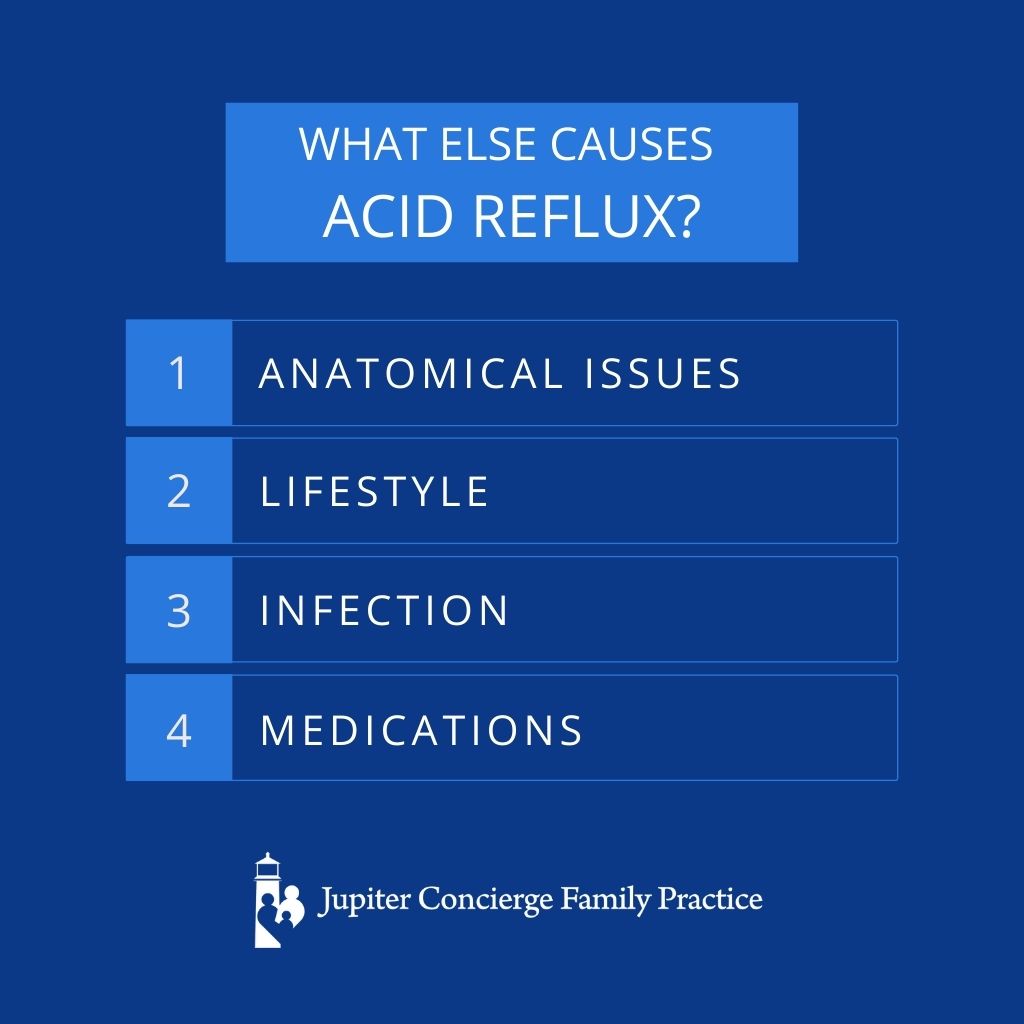
If you’ve ever felt that burning sensation in your chest after a big meal or a drink with friends, you know acid reflux is not a pleasant companion.
Unfortunately, around 20% of Americans suffer from chronic acid reflux, or gastroesophageal reflux disease (GERD), and must contend with the discomfort regularly. But what causes acid reflux, and is it actually dangerous, or just inconvenient?
Today we’ll explore why treating acid reflex is important, what causes it in the first place, and what you can do about it.
Why Treat Acid Reflux?
It’s important to treat acid reflux from a standpoint of disease progression.
Acid reflux, especially GERD, occurs on a continuum. What starts as irritating reflux can develop further as stomach acids repeatedly irritate and inflame the esophagus, causing reflux with esophagitis. As the esophagus suffers this damage over time, never getting a chance to heal, the condition can progress to Barrett’s esophagus, which can then lead to cancer of the esophagus.
Besides its potential for causing further illness, acid reflux also interferes significantly with quality of life.
The stress and anxiety from GERD, and possibly the irritation of the vagus nerve at the back of the esophagus, can trigger the autonomic nervous system, resulting in heart palpitations. The chest pain, tightness, and other symptoms of acid reflux can be difficult to distinguish from symptoms of a heart attack, sometimes even leading to a trip to the emergency room.
In addition to being inconvenient and stressful, an ER visit is expensive. Better to treat the reflux. And to treat the symptom, we must get to the root of the problem.
Can Stress Cause Acid Reflux?
There are three types of stress to consider when it comes to your health: emotional stress, food stress, and hidden stress. Each of these types of stress can cause and worsen acid reflux.
Stress stimulates your body’s production of the hormone cortisol, which can lead to the breakdown of the lining of the gastrointestinal (GI) tract, allowing stomach acid to move back into the throat more easily.
Some stress is unavoidable, but by identifying your stressors and eliminating or reducing those under your control, you can make a significant dent in reflux-causing stress.
What Else Causes Acid Reflux?
While stress can cause acid reflux, other factors may be at play, too.
Anatomical Issues
The contents of the stomach stay in place thanks to small valves, or sphincters, which open and close to let food in one way and out another. The lower esophageal sphincter, for example, sits between the stomach and the esophagus. If for some reason it malfunctions, stomach fluids can flow backwards into the throat from the stomach.
Another anatomical issue that can cause acid reflux is peristalsis gone awry. Peristalsis is the smooth muscle movement that directs food and drink downward throughout the entire human GI tract. If peristalsis isn’t happening correctly in the esophagus, instead of only going down, food can come back up, too.
Lifestyle
Specific foods can impede proper peristalsis and reduce the lower esophageal sphincter’s ability to stay closed. Consider reducing or eliminating these foods from your diet, especially if you notice an increase in acid reflux after consuming them:
- Alcohol
- Caffeine
- Fat
- Fried foods
Infection
An overgrowth of the bacteria Helicobacter pylori (H. pylori) can contribute to acid reflux. H. pylori results in an overproduction of stomach acid, increasing the likelihood of that acid traveling up the esophagus.
Medications
Certain medications can result in acid reflux. Here’s a quick list of some common reflux-causing medications and the illnesses they treat. However, please don’t take this list as an authorization to stop taking any medication recommended by your doctor. If you think a medication is contributing to your acid reflux, talk to your physician to find the best solution for your situation.
- Incontinence — Ditropan, Detrol
- COPD — Spiriva, Atrovent
- High blood pressure — calcium channel blockers
- Heart disease — ACE inhibitors, statins
- Pain — codeine, hydrocodone
- Muscle spasms — Valium
- Sleep problems — Restoril
How Long Does Acid Reflux Take to Heal?
Doctors usually make a diagnosis of acid reflux by direct visualization, meaning they use an endoscope to view the upper esophagus, as well as a biopsy.
With the appropriate treatment, it takes about one month to heal the damage caused by acid reflux.
The first treatment step in functional medicine is to remove the problem. If you can stop the acid reflux from occurring by removing its underlying cause, then your body has a chance to heal. Take a look at your lifestyle, food choices, and stressors, and see which causes you can eliminate.
If the situation is severe, you may need medication to address the problem quickly. In cases like these, we use proton-pump inhibitors like Nexium or Prilosec.
We only recommend using these medications for one month, and then discontinuing them. Proton-pump inhibitors reduce the amount of acid in the stomach, so prolonged usage of Nexium, for example, leads to an imbalance in the gut microbiome as well as poor digestion of protein.
Conclusion
Given that acid reflux occurs on a continuum with a potentially serious endpoint, it’s important not to take it lightly. The good news is, lifestyle changes and appropriate treatments can give you some control over acid reflux and give your body time to heal.

Dr. David Rosenberg
Dr. Rosenberg is a board-certified Family Physician. He received his medical degree from the University of Miami in 1988 and completed his residency in Family Medicine at The Washington Hospital in Washington, Pennsylvania in 1991. After practicing Emergency Medicine at Palm Beach Gardens Medical Center for two years, he started private practice in Jupiter, in 1993. He is an avid baseball fan and Beatles fanatic, since he was 8 years old. He has been married to his wife, Mary, since 1985 and has three grown children.
David completed additional studies at Mercer University, Macon, Georgia and obtained a BS in Chemistry in 1983.
“My interests include tennis, snow skiing, Pilates and self-development.”

